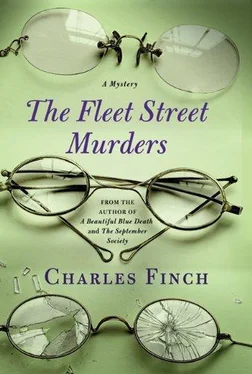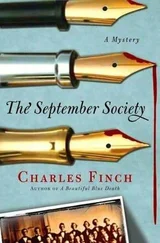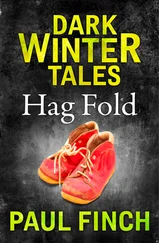Charles Finch - Fleet Street murders
Здесь есть возможность читать онлайн «Charles Finch - Fleet Street murders» весь текст электронной книги совершенно бесплатно (целиком полную версию без сокращений). В некоторых случаях можно слушать аудио, скачать через торрент в формате fb2 и присутствует краткое содержание. Жанр: Исторический детектив, на английском языке. Описание произведения, (предисловие) а так же отзывы посетителей доступны на портале библиотеки ЛибКат.
- Название:Fleet Street murders
- Автор:
- Жанр:
- Год:неизвестен
- ISBN:нет данных
- Рейтинг книги:5 / 5. Голосов: 1
-
Избранное:Добавить в избранное
- Отзывы:
-
Ваша оценка:
- 100
- 1
- 2
- 3
- 4
- 5
Fleet Street murders: краткое содержание, описание и аннотация
Предлагаем к чтению аннотацию, описание, краткое содержание или предисловие (зависит от того, что написал сам автор книги «Fleet Street murders»). Если вы не нашли необходимую информацию о книге — напишите в комментариях, мы постараемся отыскать её.
Fleet Street murders — читать онлайн бесплатно полную книгу (весь текст) целиком
Ниже представлен текст книги, разбитый по страницам. Система сохранения места последней прочитанной страницы, позволяет с удобством читать онлайн бесплатно книгу «Fleet Street murders», без необходимости каждый раз заново искать на чём Вы остановились. Поставьте закладку, и сможете в любой момент перейти на страницу, на которой закончили чтение.
Интервал:
Закладка:
The file distilled all of the crimes in which he had discovered Barnard’s involvement-or thought he had-and combined notes on them with a biographical sketch. The most elusive part of his research for the latter concerned Barnard’s recent time at the head of the Royal Mint, which was a well-guarded place both physically and informationally-a yellowing building on Little Tower Hill, near the Tower of London, which stood behind a tall wrought-iron fence, regal and, in a busy street, silent. Inside, delicate machinery converted bars of pure gold and silver into exactly weighted coins.
Digging further into the past Lenox had found, however, that Barnard’s tracks were everywhere. Lenox kept a file of London’s unsolved crimes, including both ones he had worked on and others, and so far he had attached roughly one in every nineteen to Barnard. It didn’t sound like much until one took in the immense variety and size of that file. There was the Astor Grange fire, not five miles from the city, when thousands of pounds’ worth of rare letters from Isaac Newton to his puritanical father were thought to have burned; Barnard had been staying with the private collector of the letters at the time and was well known to be fascinated by the history of Newton, who had himself once been Master of-yes, the Royal Mint. That was the higher end of things. There were also gin drunks found dead in alleyways, illegal casinos raided and their monies confiscated by people almost certainly impersonating officers of Scotland Yard, a thousand minor crimes and a hundred major ones all leading back to one man.
Lenox had for years known Barnard differently, as a politician and businessman with an ostentatious but also genuinely beautiful house off of Grosvenor Square, a place large enough to host one of London’s most famous balls. That annual event aside, however, his commonplace birth in Manchester had prevented his access to the highest tiers of society. Instead he lived in an aristocratic demimonde, the wives of his colleagues prejudiced against seeing him socially. His friends had been snobbishly chosen, men with titles and standing but also possessed of some fatal social flaw-no money, no intelligence, no scruples. He would drop their names, moving slightly higher with each new friendship, until he realized they were no good, when he would drop them instead.
When he had left Parliament for the Royal Mint, however, he had become difficult to ignore and had finally gained access to the best clubs and the best houses. There are many men who sit in Parliament, and some of them make soap; on the other hand the Mint has only one Master, and he is an exalted personage. It was at this time that Barnard had begun to court the unresponsive Lady Jane, whom Lenox had subsequently rescued from the fate of being one of the richest women in the city.
Even then, though, there had been one peculiarity about Barnard: It was a common parlor game across London to guess from which obscure source his wealth had come. At twenty-six he had been a shipping house’s clerk. He quit that job and four years later bought the shipping house. His activities in the intervening time were utterly mysterious. At the age of thirty-three he had entered Parliament.
Then, just over a year ago, Lenox had been investigating the murder of a young maid who had been in Barnard’s employ. The man himself had no involvement in the matter (Lenox had since had plenty of opportunities to observe and note how clean Barnard kept his own hands) but almost incidentally the detective had discovered that a sum of nineteen thousand pounds was missing from the Mint’s new batch of currency. Such a small sum, in the context of the vast numbers involved, and yet such a large sum in the context of the world! Exeter and his family might have lived on it their whole lives! It was this nineteen thousand pounds that had changed Lenox’s opinion of Barnard-before, he had seen him as a petty, vain, but tolerable man. Now Lenox recognized him to be perhaps the most powerful and dangerous man in London.
There was no doubt of it-Barnard was a fiendishly clever sod, and he had played his hand very carefully and very well over the years. Now Winston Carruthers and Simon Pierce were dead because of him, and perhaps Hiram Smalls and Inspector Exeter, too.
But why? He remembered Dallington’s crucial bit of information-Carruthers was corruptible. Had Barnard for some reason bribed the man and then elected to silence him?
Lenox scanned the rest of the sheet, his private and carefully compiled dossier. For muscle Barnard used the Hammer Gang, a group of East Londoners each with a green tattoo of a hammer curled around one eyebrow. Though he had a large staff in his home and at the Mint, he didn’t seem to have any particular trusted assistant.
Then something clicked into place- No green, the end of Hiram Smalls’s letter had said. Could it have been a reference to the tattoo? In effect, “Don’t get your tattoo before you pass this final test and gain entry to the Hammer Gang”? If so, Smalls had evidently failed the last test-and paid a high price for his failure. It seemed like a plausible interpretation of that mysterious phrase No green, in particular because Barnard probably knew by now that his association with the Hammers was no longer secret. He couldn’t have the man who killed Simon Pierce bear a tattoo that would link them.
Geneva-what could be there? Since retiring from the Mint (doubtless much richer than when he had begun the job, thought Lenox bitterly) he had been consulting with the government on several minor issues but had in general been very quiet.
It was ominous.
All of this flurried through Lenox’s mind in a matter of moments as he held the single sheet that defined George Barnard’s misdeeds. Then he thought that the case needed more than he and Dallington could do and called for his carriage.
It was a long drive to his destination, perhaps thirty minutes. Oxley Crescent was a small neighborhood on the southern edge of London, full of closely spaced but pleasant houses, each with a small porch and garden in front. It was to a white house with dark shutters and a charmingly askew chimney that Lenox came when he needed Skaggs.
Skaggs’s wife answered the door, an insistent and gregarious creature who first shed a tear over poor Inspector Exeter, then scolded Lenox for coming to take her husband away again, and finally insisted he kiss the baby slung low on her hip, all as a toll before he could get through to the house.
Rupert Skaggs, a man who had once been the best middleweight boxer for a two-mile radius, was fearsome looking, with a bald head, a fat, intelligent face, and a long scar across the left side of his neck, but in truth his wife and his three children had lent him some docility, and he was quite happy in his little home. His looks still often came in handy, however; he was the best private investigator in England, if you asked Lenox. Once Skaggs had found a job as a waiter in order to gather information for him, and since then Lenox had never doubted him. He was forced to pay for Skaggs out of his own pocket, but then, he always reasoned, what higher purpose than justice was money for? Besides, less loftily, Skaggs always saved him so much time and effort-much of the unrewarding work of detection belonged to him, under Lenox’s supervision.
“Hello, Mr. Lenox,” said Skaggs with a pipe in one hand. He had come onto the porch at his wife’s call.
“How do you do, Mr. Skaggs?”
“Passably well. I haven’t seen you for some time.”
Now, this was true-and true because of Dallington. Lenox shifted slightly. “No, and I’m very sorry to call on you so late in the evening. I hope I haven’t interrupted supper?”
“No, not quite yet.”
“That’s all right then.”
Читать дальшеИнтервал:
Закладка:
Похожие книги на «Fleet Street murders»
Представляем Вашему вниманию похожие книги на «Fleet Street murders» списком для выбора. Мы отобрали схожую по названию и смыслу литературу в надежде предоставить читателям больше вариантов отыскать новые, интересные, ещё непрочитанные произведения.
Обсуждение, отзывы о книге «Fleet Street murders» и просто собственные мнения читателей. Оставьте ваши комментарии, напишите, что Вы думаете о произведении, его смысле или главных героях. Укажите что конкретно понравилось, а что нет, и почему Вы так считаете.












